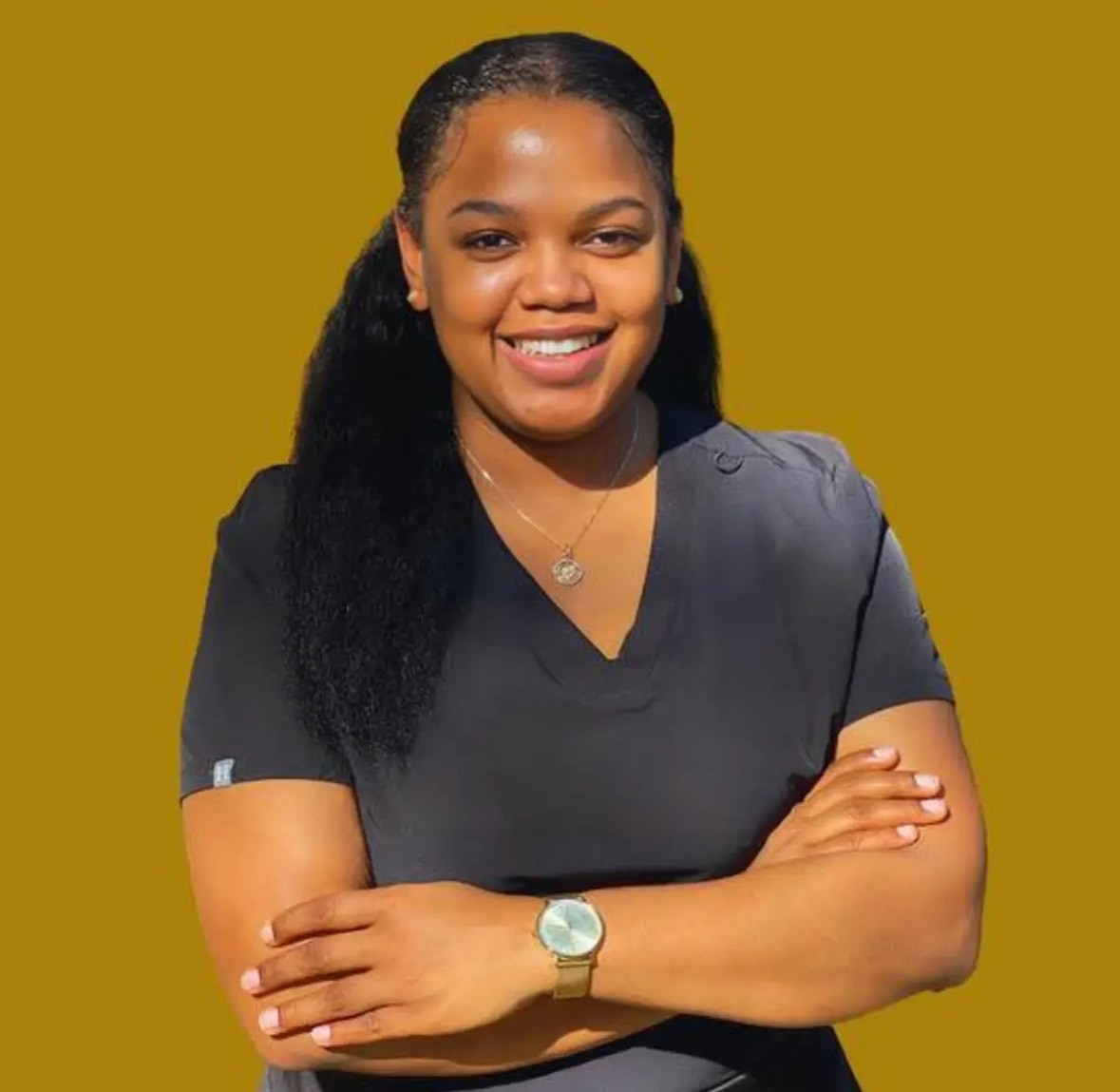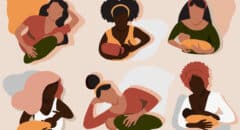
Rachell Dumas’ journey into maternal health advocacy wasn’t something she planned—it was something she lived. She experienced medical gaslighting, pregnancy loss, and countless obstacles while fighting for her own care including traveling from Atlanta to Texas to receive the treatment she needed. It was a traumatic experience, but it led her to create A Light After Nine, a nonprofit dedicated to helping mothers through difficult pregnancy journeys.
A Journey Fueled by Personal Struggles
Dumas’ journey into advocacy began with her own traumatic experiences navigating the healthcare system. As someone with a background in healthcare, she was shocked to find herself dismissed and overlooked when seeking medical care during pregnancy.
“I had multiple pregnancy losses before finally having my son. That path was filled with gaslighting—fighting medical racism, not being listened to, not being given all my options for treatment. There were times I had to travel across states just to find a doctor who would take my concerns seriously,” she shares, adding that this treatment led to nine miscarriages.
After finally giving birth to her son, she realized that many other women were facing similar struggles.
“I knew I wasn’t alone. Too many Black women experience this. The statistics say we’re three to four times more likely to die from pregnancy-related causes than white women, and that’s not just numbers—it’s reality. I lived it,” Dumas adds.
This motivated her to launch her nonprofit organization, A Light After Nine, to provide support, resources, and advocacy for mothers in need.
“I started my nonprofit to help other mothers build their village and navigate the healthcare system. We advocate for them, make sure their medical records reflect what they actually need, and provide financial grants because pregnancy, loss, and medical bills are expensive,” Dumas notes.
The Mission of A Light After Nine
Life After Nine is dedicated to addressing maternal health disparities and ensuring that every mother receives compassionate and competent care. The organization focuses on several key areas:
- Medical Advocacy: Educating and supporting mothers to advocate for themselves in medical settings.
- Financial Assistance: Providing grants to help cover medical bills, fertility treatments, and pregnancy-related expenses.
- Mentorship Programs: Connecting experienced mothers with those navigating challenging pregnancies.
- Policy Change & Awareness: Working with hospitals and legislators to improve maternity care policies.
- Partnerships with Major Organizations: Collaborating with groups like March of Dimes and Huggies to amplify advocacy efforts.
RELATED: Dr. Perkins on Black Maternal Health Crisis: “Trust Me When I Say I’m In Pain”
Collaborations That Strengthen Advocacy
Dumas understands that partnerships with larger organizations are crucial in expanding the reach of her advocacy. Through her work with March of Dimes and Huggies, she has helped ensure that the broader maternal health crisis—especially within the Black community—is addressed at a national level.
“Collaboration is key in this work. When you’re a smaller organization, it’s easy to get lost in the shuffle, but by partnering with larger groups, we ensure that our message is heard. We’ve done webinars, educational sessions, and hands-on support programs to make sure that women have access to the information they need,” she shares.
Challenges Black Women Face in Maternal Healthcare
The statistics are alarming: Black women are more likely to die from pregnancy-related complications than white women, even when accounting for socioeconomic factors.
“We hear these numbers all the time—how Black women are three to four times more likely to die from pregnancy-related complications. And recently, the CDC said maternal mortality rates are improving for most women—except for Black women,” Dumas notes.
Dumas emphasizes several key barriers that contribute to this crisis:
- Medical Racism: Implicit biases in healthcare lead to Black women’s concerns being ignored or dismissed.
- Lack of Culturally Competent Providers: Many doctors fail to understand or address the specific needs of Black mothers.
- Limited Access to Quality Care: Many women struggle to find specialists or hospitals that provide equitable treatment.
- Financial Barriers: The high costs of pregnancy-related care prevent many women from receiving necessary treatments.
The problem isn’t just access to healthcare—it’s racism within the system.
“There’s a lack of culturally competent providers. They make assumptions about us—our economic status, our education level—and they treat us as if what we’re saying isn’t relevant. They ignore our symptoms. And that’s how we die,” Dumas says. “You can’t fix a problem you don’t acknowledge.”
Through A Light After Nine, Dumas is working to dismantle these barriers by educating women on their rights, training healthcare professionals, and advocating for systemic change.
“Here’s the thing—you can’t advocate for yourself if you don’t know what to advocate for,” Dumas adds.
Advice for Black Women Navigating the Healthcare System
Dumas offers several practical tips for Black women seeking maternal care:
Get Educated: Learn about pregnancy, medical conditions, and your rights as a patient.
“Even though I was a registered nurse when I started my pregnancy journey, I still didn’t know what I needed to know. I worked in trauma ICU—pregnancy wasn’t my specialty. And if I, as a medical professional, was struggling to understand my own care, imagine how hard it is for someone without that background,” Dumas says.
Build a Support Team: Having a doula, a knowledgeable partner, or a trusted friend can make a huge difference in medical settings.
“Doulas are a great option because they can speak both languages—the medical side and the emotional side. If you have a partner who knows your body well, make sure they’re informed too. A trusted friend or family member who can advocate for you is also crucial,” Dumas adds.
Seek a Second Opinion: If a doctor dismisses your concerns, find another provider who will listen.
“Sometimes we get stuck with providers who dismiss us. And if you feel like your concerns aren’t being taken seriously, go to another doctor. Not all providers are willing to offer every treatment option—some just don’t have the experience. Find someone who does,” Dumas advises.
Use Available Resources: Organizations like A Light After Nine provide free education, support, and grants to help cover medical expenses.
What Healthcare Providers Need to Change
One of the biggest things missing in healthcare is true trauma-informed care.
“Sure, providers go through mandatory training, but a lot of times, it’s just a slideshow on a computer. Click through, answer a couple of questions, and you’re ‘trained.’ That’s not real education,” Dumas notes.
Given her fair share of experience in medical education—she graduated with a BSN from Chamberlain University and is currently earning an MSN in nursing informatics from Walden University—Dumas insists that hands-on, immersive training is essential.
“Imagine a grand rounds-style training where providers actually see and hear patient experiences in a meaningful way. That would be far more impactful,” Dumas adds.
Additionally, “providers need to listen more. I know there are constraints—insurance, workload—but when you rush through appointments, you miss things. And missing things costs lives,” Dumas warns.
RELATED: Redefining Black Maternal Care: 3 Ways to Take Charge of Your Health
The Future of Maternal Health Advocacy
Looking ahead, Dumas is focusing on expanding Life After Nine’s case management services and building stronger partnerships. But she’s also excited about some big projects:
- Her First Book:
“It’s called Trauma Made Me Do It, and it’s about turning personal trauma into something meaningful—something that helps others. I want women to know they can thrive after trauma, not just survive,” she shares. - The Birther Expo:
“Next year, I’m hosting a multi-city expo where patients can engage with interactive, virtual reality experiences. Partners will get to see what it’s really like to go through pregnancy complications and experience the healthcare system as we do,” she adds.
“I want to create a space where women don’t have to go through what I went through. If I had known half of what I know now during my pregnancy, I could have avoided so much pain. That’s why I do this work.”
Conclusion
Rachell Dumas is turning her pain into power by advocating for better maternal healthcare. Through her nonprofit, partnerships, and upcoming projects, she is ensuring that no mother has to navigate pregnancy alone.
“This work is personal, but it’s also necessary. And I’ll keep fighting until we see real change,” she concludes.
For more information about her work, visit A Light After Nine’s website or connect with Rachell Dumas on LinkedIn.









